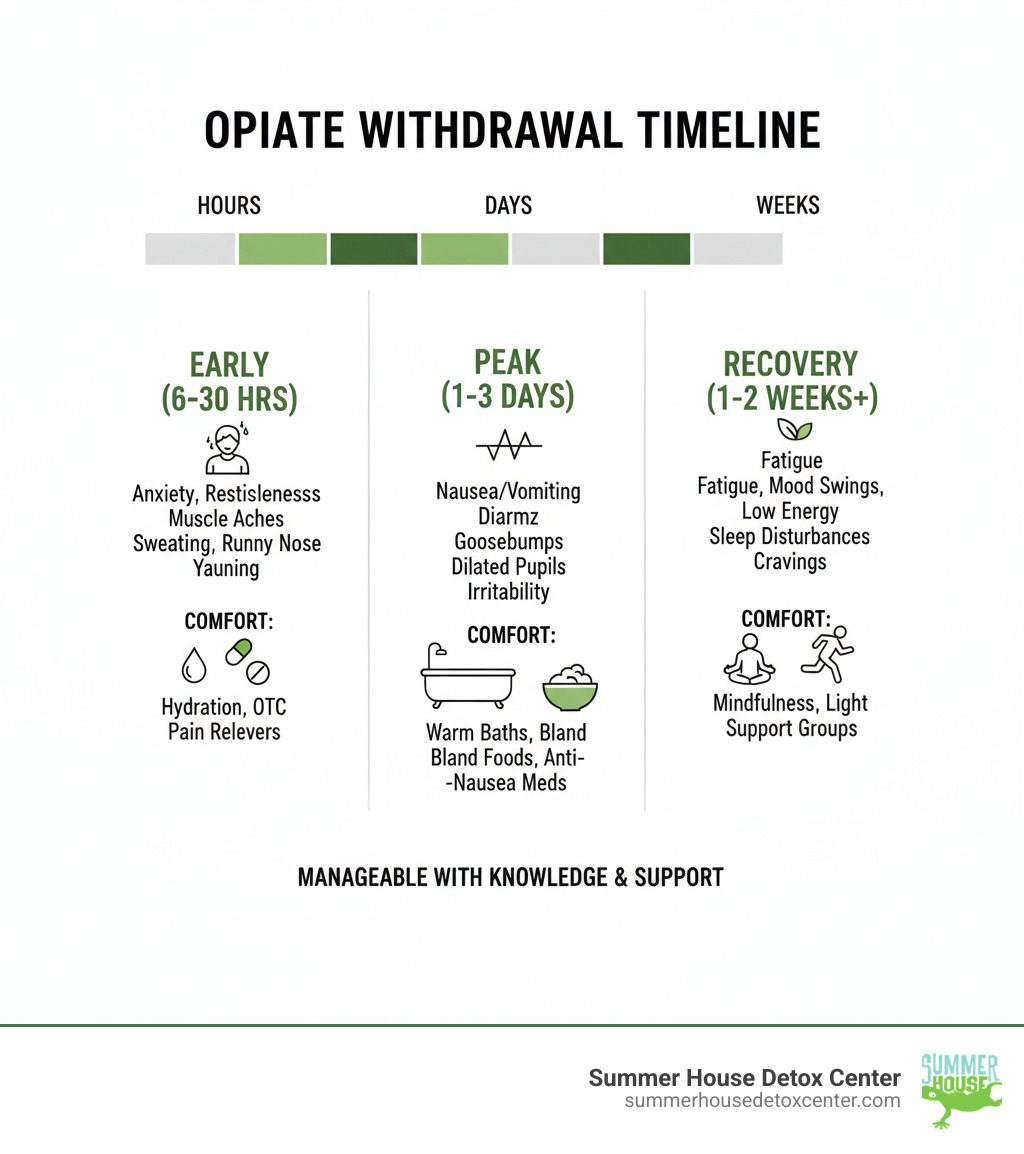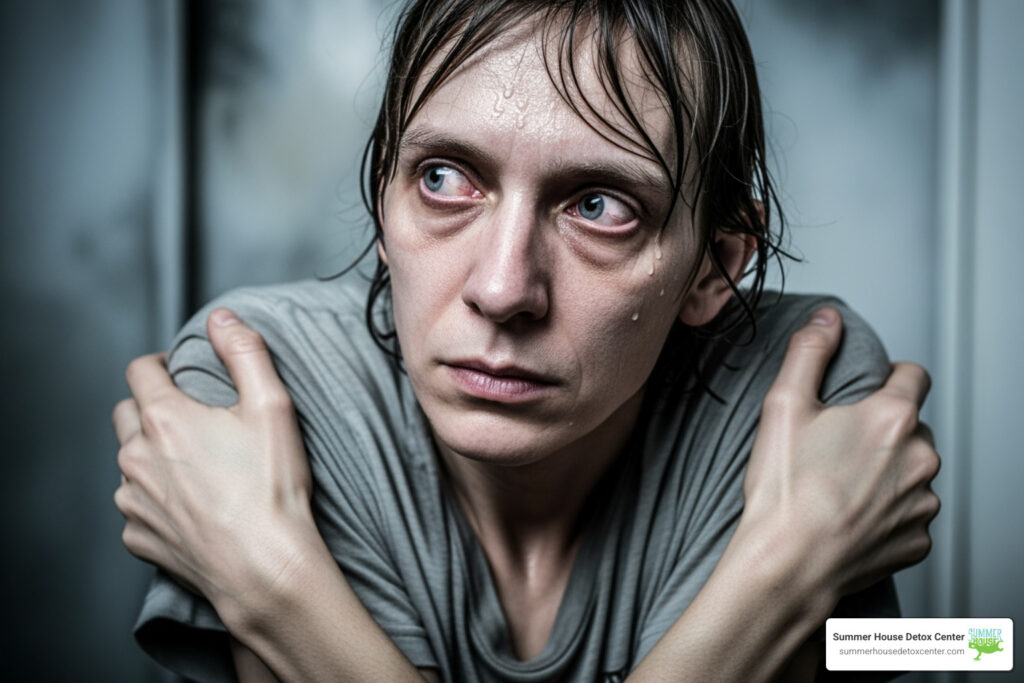Why Understanding Opiate Withdrawal Symptoms Matters for Your Recovery
How to lessen opiate withdrawal symptoms starts with understanding what you’re facing. With the right knowledge and support, this process can be manageable and safe.
Quick ways to lessen opiate withdrawal symptoms:
- Stay hydrated – drink 2-3 liters of water daily
- Get medical supervision – prevents dangerous complications
- Use comfort medications – clonidine for anxiety, anti-nausea drugs
- Take warm baths – helps with muscle aches and restlessness
- Eat bland, nutritious foods – bananas, rice, toast, soup
- Rest in a quiet environment – reduces overstimulation
- Avoid alcohol and kratom – these can worsen symptoms or create new dependencies
In Florida and across the U.S., many struggle with the fear of withdrawal. Every day, 130 people die from opioid overdoses in the United States, a statistic that highlights the urgency of finding a safe path to recovery.
The good news is that withdrawal, while uncomfortable, is not usually life-threatening with proper management. Symptoms like muscle aches, nausea, and anxiety typically peak in the first few days and improve over 1-2 weeks.
The key is knowing what to expect and having a plan. Understanding your options for detox is key to a successful recovery.

Simple guide to how to lessen opiate withdrawal symptoms:
- opiate withdrawal symptoms
- how long does withdrawal symptoms last from opiates
- does gabapentin help with opiate withdrawal symptoms
Understanding Opiate Withdrawal: Symptoms and Timeline

Regular opioid use leads to opiate dependence, where your body adapts and needs the substance to feel normal. Opioid tolerance also develops, meaning you need higher doses for the same effect, which can make withdrawal more challenging when you stop.
Understanding the predictable stages of withdrawal can help you feel more in control of your recovery. Medical professionals use the Clinical Opioid Withdrawal Scale (COWS) to measure symptom severity and determine the level of care needed.
The Stages of Withdrawal
Withdrawal unfolds in stages, and knowing what’s coming can help you prepare.
Early symptoms (6-24 hours post-use) often feel like the flu. You may experience agitation, anxiety, muscle aches, a runny nose, and increased sweating.
As withdrawal progresses, late symptoms become more intense. These include abdominal cramping, diarrhea, nausea, and vomiting. You might also notice enlarged pupils and goosebumps, even in Miami’s warm weather.
Psychological symptoms like irritability, depression, and heightened anxiety are also a normal part of the process. Many people in Florida report feeling an intense restlessness, especially in their legs.
While these symptoms feel overwhelming, they are generally not dangerous when properly managed. At Summer House Detox Center, we help people through this process safely and comfortably. You can learn more in our guide to opiate withdrawal symptoms.
How Long Does Withdrawal Last?
The withdrawal timeline depends on several factors:
- Type of opioid: Short-acting opioids (e.g., heroin, immediate-release oxycodone) typically cause withdrawal symptoms for 4-10 days. Long-acting opioids (e.g., methadone) can extend the timeline to 10-20 days or more.
- Duration of use: Using opioids for months or years often means a longer withdrawal period as your body needs more time to adjust.
- Individual health factors: Your overall health, metabolism, and other medical conditions influence your experience.
For most people, intense physical symptoms peak around day 3 and begin to improve after the first week. However, psychological symptoms like mood swings and cravings can linger for weeks or months. This is normal and why ongoing support is so important.
For a deeper dive into timing, check out our article on how long does it take to withdraw from opiates.
Medically-Supervised Detox: The Safest Way to Manage Withdrawal

When it comes to how to lessen opiate withdrawal symptoms, medically-supervised detox is the safest and most effective method. Detoxing alone can be dangerous. While withdrawal itself is rarely fatal, complications can be life-threatening, making medical supervision the smartest choice.
At Summer House Detox Center in Miami, our team provides 24/7 monitoring of vital signs and symptoms to ensure your safety. The risks of detoxing alone include severe dehydration from vomiting and diarrhea, which requires medical attention. Aspiration pneumonia (inhaling vomit) is another serious risk. While people often ask Is Opiate Withdrawal Deadly?, the truth is that these complication management issues can be fatal. In our supervised environment, we prevent these problems from becoming emergencies.
Medications Used in Opiate Detox
Several FDA-approved medications can significantly ease withdrawal.
- Methadone: A long-acting opioid, it relieves withdrawal symptoms and cravings by providing a steady effect without the highs and lows.
- Buprenorphine (in Subutex): As a partial opioid agonist, it gently activates opioid receptors, shortening detox and making it more manageable. When combined with naloxone (in Suboxone), it has features that discourage misuse. The FDA has noted some dental problems when the medication dissolves in your mouth, so we’ll ensure you know how to protect your teeth while using it.
- Lofexidine: This non-opioid medication, approved in 2018, calms the overactive nervous system response that causes many physical withdrawal symptoms.
- Clonidine: This medication is highly effective for physical symptoms like anxiety, muscle aches, sweating, and cramping, significantly increasing comfort during detox.
These medications are powerful allies. Learn more in our guide on Which medications are used in opiate detox?.
Comfort Medications for Symptom Relief
We also use comfort medications to target specific symptoms.
- Gabapentin for anxiety: Widely used off-label, it is very effective for reducing anxiety, restless legs, and insomnia. Learn more in Does Gabapentin help with opiate withdrawal symptoms?.
- Anti-nausea medication: Medications like ondansetron prevent vomiting and the dangerous dehydration it can cause.
- Sleep aids: We use non-addictive options to help you get the restorative sleep your body needs to heal.
- Pain relievers: Over-the-counter options like ibuprofen can manage muscle aches, with non-opioid prescription alternatives available if needed.
The goal is to make your detox as gentle as possible so your body can heal without unnecessary suffering.
How to Lessen Opiate Withdrawal Symptoms: At-Home Strategies and What to Avoid

While medical detox is safest, these at-home strategies can increase comfort, especially when used with professional support. Focus on basic self-care and avoid anything that could complicate your recovery.
- Hydration is critical. Sweating and diarrhea cause fluid loss. Aim for 2-3 liters of water, broth, or electrolyte drinks daily, which is especially important in Florida’s heat.
- Keep nutrition simple. Stick to bland, easy-to-digest foods like the BRAT diet (bananas, rice, applesauce, toast) and chicken soup.
- Create a calm environment. A quiet, comfortable space helps reduce stress on your nervous system.
Recommended foods and drinks for withdrawal:
- Bananas (potassium helps with muscle cramps)
- Plain rice and toast (gentle on the stomach)
- Clear broths (hydration plus electrolytes)
- Herbal teas like chamomile (caffeine-free and soothing)
- Crackers (easy to keep down when nauseous)
- Coconut water (natural electrolytes)
How to lessen opiate withdrawal symptoms for physical pain
Simple, natural remedies can provide real relief for physical discomfort.
- Take hot baths or showers. Warm water soothes aching muscles and restlessness. Epsom salts can provide extra relief.
- Use heating pads for targeted relief of back pain, leg aches, or stomach cramps.
- Try over-the-counter pain relievers like ibuprofen, but always check with a doctor first to avoid interactions.
- Try gentle stretching. Even simple movements can ease muscle tension.
- Prioritize rest. Allow your body the time it needs to heal. This is a medical recovery process, not laziness.
How to lessen opiate withdrawal symptoms like anxiety and insomnia
Your brain is readjusting its chemistry, which can cause anxiety and sleep issues.
- Practice deep breathing. Simple exercises (e.g., inhale for 4, hold for 4, exhale for 6) can activate your body’s relaxation response.
- Use mindfulness techniques to ground yourself. The 5-4-3-2-1 sensory method can pull you out of anxious thought spirals.
- Limit caffeine. It can worsen anxiety and overstimulation. Switch to herbal tea.
- Establish a sleep routine. A consistent schedule, a cool dark room, and no screens before bed can help. For more strategies, see How can I cope with insomnia after opiate detox?.
What to Avoid for a Safer Detox
Knowing what to avoid is as important as knowing what helps.
- Kratom: This is not a safe alternative. It can cause its own addiction and withdrawal, and the FDA warns against its use due to safety concerns and contamination.
- Alcohol: Alcohol worsens dehydration, increases anxiety, and can have dangerous interactions with detox medications, including slowing your breathing.
- Benzodiazepines: These are highly addictive and dangerous when used during withdrawal, as the combination with opioids can lead to fatal respiratory depression.
- Unproven herbal remedies: Be wary of these. They are unregulated and can have unknown ingredients or dangerous interactions. Always consult your medical team first, though you can learn more here: Herbal Remedies for Opiate Withdrawal Symptoms.
Building a Life After Withdrawal: Support and Long-Term Recovery

Completing detox is a major achievement, but it’s the first step in a longer journey. After detox, your opioid tolerance is significantly lower. This creates a high risk of fatal overdose if you relapse and use your previous dose. This is why post-detox support is not optional—it’s essential.
Learning how to lessen opiate withdrawal symptoms was the first challenge; now, you must build a fulfilling, substance-free life. Florida’s supportive recovery community and healing environment can help you create new, healthy routines away from old triggers. With proper support, the prognosis is hopeful. Our guide on Opiate Detox Centers: How to Find the Best Support for Your Needs can help you steer these next steps.
The Role of Counseling and Therapy
Therapy provides practical skills for a future without opioids.
- Individual counseling: A therapist helps you address the root causes of addiction, identify triggers, and develop healthy coping strategies.
- Group therapy: Connecting with peers in group therapy provides a powerful sense of community and shared understanding, reducing feelings of isolation.
- Cognitive-Behavioral Therapy (CBT): This practical approach teaches you to identify, challenge, and change the negative thought patterns that can lead to relapse.
Finding a therapist in the Miami area who specializes in addiction is a key step.
Finding a Community of Support
Recovery works best when you’re not doing it alone.
- Narcotics Anonymous (NA): NA offers a free, anonymous 12-step program with meetings available throughout Florida, providing structure, accountability, and peer support. Find meetings at Narcotics Anonymous (NA).
- SMART Recovery: This science-based alternative uses a 4-Point Program to empower you with tools for managing urges and living a balanced life. Learn more at smartrecovery.org.
- Family support: Family therapy helps heal relationships and educates loved ones on how to provide effective support without enabling, rebuilding trust and communication.
Staying connected to a supportive community is crucial for long-term success.
Frequently Asked Questions about Easing Opiate Withdrawal
Here are answers to common concerns we hear from people in Miami who are ready to start their recovery.
When should I seek immediate medical help during withdrawal?
While many symptoms can be managed, some are medical emergencies. Your safety is the top priority.
Call 911 immediately for: uncontrollable vomiting or diarrhea, chest pain, severe difficulty breathing, seizures, or hallucinations.
If you have suicidal thoughts, call or text the 988 Suicide and Crisis Lifeline immediately. Free, confidential support is available 24/7.
Can you really die from opiate withdrawal?
Directly, it’s rare. However, life-threatening complications can occur. Severe dehydration from vomiting and diarrhea is a major risk, especially in Florida’s heat. Aspiration pneumonia (inhaling vomit) is another serious danger. The physical stress can also trigger cardiac issues in those with pre-existing conditions. This is why medical supervision is critical—to manage these risks.
Why is relapse so dangerous after detox?
This is one of the most important things to understand. Detox dramatically lowers your physical tolerance to opioids. If you relapse, your previous ‘normal’ dose can now be a fatal overdose. The period immediately following detox is the highest-risk time for overdose death. This is why ongoing support and aftercare are not just recommended—they are essential for survival and long-term recovery.
Start Your Recovery in Miami, Florida
If you’re ready to stop using opioids but feel scared, know that you are not alone. Every successful recovery journey starts from this exact point. Withdrawal is a tough but necessary first step. With professional support, it is safer and far more manageable. You don’t have to do it alone.
At Summer House Detox Center in Miami, our mission is to help you understand how to lessen opiate withdrawal symptoms from the moment you arrive. We treat the whole person, recognizing the individual behind the addiction. Our personalized, medically supervised detox programs are custom to your needs. With staff members in recovery themselves, we offer genuine empathy and understanding.
Choosing Florida for detox provides a healing change of scenery. Our peaceful Miami facility allows you to focus entirely on your recovery, away from daily triggers. The palm trees outside are a reminder that you’re in a place designed for new beginnings. You can learn more about Why Choose Florida for Opiate Detox and how our compassionate approach can make all the difference.
Take the first step. Our compassionate, medically-supervised opiate detox program in Miami is here to guide you. Contact us today to learn about our comprehensive Detox Services/Opiate Detox and begin the journey to the life you deserve.
